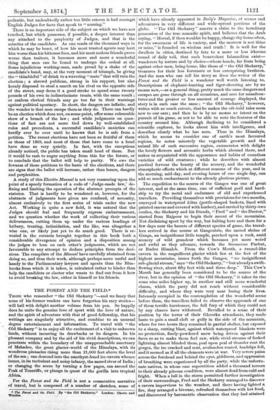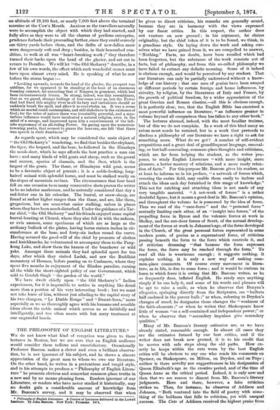THE FOREST AND THE FIF.T.1).*
• The Forest and the Field. By • the Old Shekarry." London: Chan.* and Windne.
ThosE who remember "the Old Shekarry "—and we fancy that none of his former readers can have forgotten his racy stories— will hail with delight another volume from his pen. So happily does he unite the genuine love of sport with the love of nature, and the spirit of adventure with that of good-fellowship, that his writings are singularly attractive, and combine to an unusual degree entertainment and information. To travel with " the - Old Shekarry" is to enjoy all the excitement of a visit to unknown lands, without incurring its drawbacks or its dangers. In his pleasant company and by the aid of his vivid descriptions, we can penetrate within the boundary of the unapproachable sanctuary of Mahadeo, the great glacier-world of the Himalaya, with its wondrous pinnacles rising more than 21,000 feet above the level of the sea ; can descend into the amethyst-hued ice-cavern whence issues, in its turbulent and noisy infancy, the sacred river of India; or changing the scene by turning a few pages, can ascend the Peak of Teneriffe, or plunge in quest of the gorilla into tropical Africa.
For the Forest and the Field is not a consecutive narrative of travel, but is composed of a number of sketches, some of which have already appeared in Belly's Magazine, of scenes and adventures in very different and wide-spread portions of the globe. "The Old Shekarry" asserts a claim to the hereditary possession of the true nomadic spirit, and believes that the Arab saying, "Mortal, if thou wouldst be happy, change thy home often, for the sweetness of life is variety, and the morrow is not thine or mine," is founded on wisdom and truth ! It is well for the dwellers in cities, destined by fate to a more or leas irksome round of daily toil, that such benevolent Ishmaelites exist— wanderers by nature and by choice—whose hands, far from being against other men, bring home, like those of "the Old Shekarry," treasures for their less fortunate or less enterprising brethren. And the man who can tell his story as does the writer of the Forest and the Reid is a wanderer well worth listening to. Descriptions of elephant-hunting and tiger-shooting are by no means new,—as a general thing, pretty much the same dangers and escapes are gone through on all occasions, and save for misadven- tures and the greater or less amount of courage displayed, the story is in each case the same ; "the Old Shekarry," however, writes with so much entrain, that he makes the oft-told tales seem new to our ears ; and then he is by no means so intent on the pursuit of his game, as not to be able to note the features of the country around him. Although declining to be considered a scientific explorer, he looks about him with intelligence, and describes clearly what he has seen. Thus in the Himalaya, which he seems to consider one of earth's most favoured regions, he notes minutely the vegetable growth and the animal life of each successive region, enumerates with delight the lovely flowers and aromatic herbs which abound there, and makes us acquainted with the appearance and habits of countless varieties of wild creatures ; while he describes with almost poetical fervour the beauty of the scenery, and the wonderful atmospheric effects which at different seasons of the year, and in the morning, mid-day, and evening hours of one single day, can add so much enchantment to the already glorious picture.
The expedition to the source of the Ganges was one of great interest, and at the same time, one of sufficient peril and hard- ship to try the metal and endurance of old and experienced travellers. Providing themselves with provisions for two months, conveyed in waterproof kiltas (pottle-shaped baskets, lined with painted canvas and covered with leather), and carried by thirty-two coolies, the Shekarry and his friends, " Fred " and " the Doctor," started from Rajpoor to begin their ascent of the mountains. Not disdaining sport by the way, but halting here and there for a few days near the haunts of different species of game, the travel- lers arrived in due course at Gangoutrie, the sacred shrine of Gunga, an insignificant little temple, perched upon a rock, amid scenery of wild grandeur which becomes yet more weird and awful as they advance, towards the Sootueroo Ptubut, or Rudru Ilimaleh. From the Cow's Mouth, a tunnel-like cavern in the magnificent glacier which lies at the feet of the highest mountains, issues forth the Ganges, "no insignificant sub-glacial stream," says "the Old Shekarry," "but already a swift- flowing river, about fifty feet wide and three deep." This Cow's Mouth has generally been considered to be the source of the river, but in the opinion of "the Old Shekarry," it takes its rise some nine miles higher up, in another and still more wonderful chasm, which the party did not reach without considerable difficulty, and where they were very near losing their lives. Intensely occupied in the contemplation of the wonderful scene before them, the travellers failed to observe the approach of one of those terrific hurricanes, the full fury of which they could not by any chance have withstood. Recalled to a sense of their position by the terror of their Ghoorka attendants, they made haste to gain a small cleft or gully in the side of the mountain, where for two hours they remained in partial shelter, but exposed to a sharp, cutting blast, against which waterproof blankets were no protection, finely-powdered snow being driven against their faces so as to make them feel raw, while vivid streams of forked lightning almost blinded them, peal upon peal of thunder rent the gorges, the ice cracked and rent, avalanches roared, landslips fell, and it seemed as if all the elements were'at war. Very severe pains across the forehead and behind the eyes, giddiness, and oppression of breathing were experienced by all the party, while the unfortu- nate natives, in whose case superstition added a thousand terrors
to their already piteous condition, were almost dead from cold and fright. When a lull in the storm permitted further investigation of their surroundings, Fred and the Shekarry managed to discover a cavern impervious to the weather, and there having lighted a. fire, they arranged a bivouac, refreshed themselves with hot food, and discovered by barometric observation that they had attained
an altitude of 19,160 feet, or nearly 7,000 feet above the terminal moraine at the Cow's Mouth. Anxious as the travellers naturally were to accomplish the object with which they had started, and fully alive as they were to all the - charms of perilous enterprise, prudence forbade their proceeding farther, since they could scarcely see thirty yards before them, and the drifts of new-fallen snow were dangerously soft and deep ; besides, in their benumbed con- dition, to walk at all was "heart-breaking work ;" they therefore turned their backs upon the head of the glacier, and set out to return to Derallee. We will let "the Old Shekarry" describe, in a -few of his own words, the effect which such wonderful scenes must have upon almost every mind. He is speaking of what he saw before the storm began :— " Looking upwards, towards the head of the glacier, the prospect was sublime, for we appeared to be standing at the base of an enormous foaming cataract, far exceeding that of Niagara in grandeur, which had been instantaneously frozen. So strong, indeed, was this resemblance, that as we gazed, strange feelings of fear came over us, lest the Power that had fixed this mighty river in all its fury and turbulence should as suddenly break the spell, and allow it to overwhelm us. It was a scene whilohno mortal could contemplate, and still disbelieve in the existence of God; for the voice of nature there was irresistibly powerful, and a mys- terious influence would have inculcated a natural religion, even in the mind of a savage, and impressed upon him a consciousness of the infi- nite supremacy of an all-ruling Power. On gazing upon the numerous towering peaks, that seemed to pierce the heavens, one felt 'that there was speech in their dumbness.' " As regards sport, which may be considered the main object of " the Old Shekarry's " wandering, we find that besides the elephant, the tiger, the leopard, and the bear, he followed in the Himalaya the musk-deer, which he says affords the best practice a man can 'have; and many kinds of wild goats and sheep, such as the gooral and Barrow, species of chamois, and the ibex, which is the largest of the goats. The thaar, or Himalayan wild goat, seems to be a favourite object of pursuit ; it. is a noble-looking, long- haired animal with splendid horns, and must be stalked warily on the slopes of mountain ravines. The circumstance that four head fell on one occasion to so many consecutive shots proves the writer to be no inferior marksman, and he naturally considered that day a red-letter one in his calendar. The burrul, or snow-sheep, are found at rather higher ranges than the thaar, and are, like them, gregarious, but are somewhat easier stalking, unless in places -where they have been much disturbed. Under the guidance of a Tar- tar chief, "the Old Shekarry " and his friends enjoyed some capital burrul-hunting at Chusul, where they also fell in with the naheen, or ovis ammon, some specimens of which are as large as the orclinary bullock of the plains, having horns sixteen inches in cir- ammference at the base, and forty-six inches round the curve. Having secured the good-will of the chief by presents of clothes and knickknacks, he volunteered to accompany them to the Pang- kung Lake, and show them the haunts of the bunchowr or wild yaks. Amongst these animal' ; they had splendid sport for ten days, after which they visited Ladak, and saw the Buddhist monastery of Hermes, before passing on to Cashmere, where they spent five months in enjoyment of the Hindoo paradise, cursing all the while the short-sighted policy of our Government, which sold to Goolab Singh "the garden of the world."
We have dwelt chiefly upon "the Old Shekarry's " Indian experiences, for it is impossible to notice in anything like detail more than a portion of his very interesting book ; but we must not take leave of him, without just alluding to the capital story of his two chargers, "Le Diable Rouge" and "Desert-born," more especially as we so thoroughly agree with his humane and sensible ideas about the noble animal which serves us so faithfully and intelligently, and too often meets with but sorry treatment at .our ungrateful hands.































 Previous page
Previous page